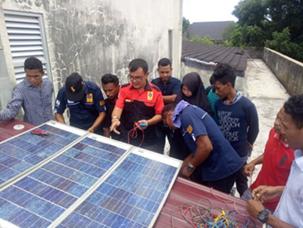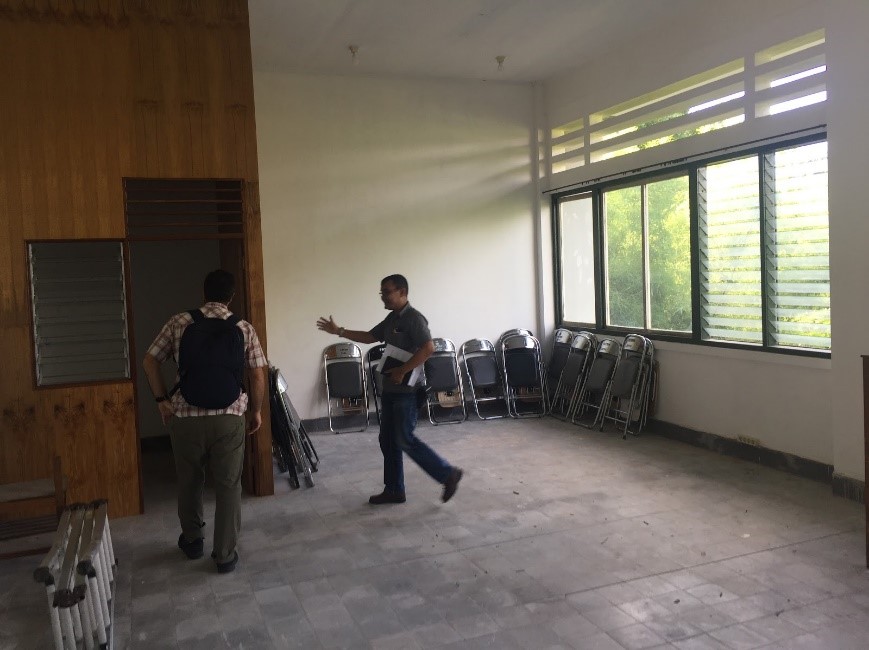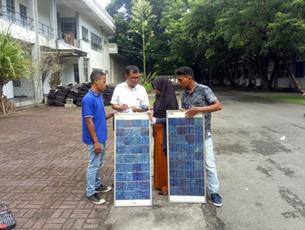A campus mini-grid lab in Maluku will offer engineering students practical experience that may produce a groundswell of interest in renewable energy technologies.
Maluku, a province in Eastern Indonesia, is an archipelago comprised of 1,422 islands scattered across 850,000 square kilometers. The islands—once known as the Spice Islands, due to the abundance of nutmeg, mace, and cloves produced there—are home to 1.7 million people residing in more than 1,200 remote villages.
Access to energy is a challenge for inhabitants of these remote islands — it can take several days to reach many, and some are accessible only by boat. The extreme remoteness makes it challenging to install, maintain and sustain reliable energy system operations.
Mauricio Solano-Peralta, a renewable energy engineer with Infratec Ltd., has been working to establish clean, sustainable power throughout Maluku Province along with his team from New Zealand-Maluku Access to Renewable Energy Support (NZMATES). Their focus is assessing and moving forward with new microgrid and solar energy projects in the province.
They’re currently developing an exciting educational deployment—the Pūngao Pattimura Mini-grid Training Lab—on the Pattimura University (UNPATTI) campus. The single-phase mini-grid, intended to mimic a village system with 5 loads, will be built using an AC-coupled system that includes 6 kWp of PV and a 15 kWh BYD battery.

The system can operate grid-connected to feed loads in the engineering department, but most of the time will likely be in off-grid mode and operate independently to run experiments and trainings. While this microgrid installation may seem small by industry standards, the ripple effects of small systems can be extraordinary.
The lab’s development is a collaborative effort, with funding from the New Zealand Ministry of Foreign Affairs and Trade, through NZMATES, and a contribution from Pattimura University. Its name is symbolic of this partnership. Pūngao means “energy” in Te Reo Māori, and Pattimura is an Indonesian national hero from Maluku. While the installation was initially delayed by the pandemic, PT Syntek Otomasi Indonesia (Syntek Energy & Control) is under contract and on-track to begin construction in February with strict COVID-19 protocols in place.
The lab system will provide students with real-life experience working on a microgrid, practical exercises and a system that they are able to experiment with. Mauricio hopes that it will educate upcoming generations about renewable energy, train a local workforce and inspire entrepreneurs in the decades to come.

Mauricio and teammates Andrew Crossland, Kurnia Setiawan and Maryam Muthi’ah Karimah, designed the system to replicate a village with five houses or loads. It gives students an opportunity to experiment and recreate similar systems elsewhere—on islands throughout Indonesia and beyond. Without the lab, there is no operating solar installation for the university’s students or interested professionals to apply their theoretical learning. The team has collaborated with UNPATTI engineering professor, Antoni Simanjuntak.
They modeled the lab system with HOMER Pro to find the ideal size and to compare outcomes with various load levels. In the future, the lab will allow students to compare lab-simulated loads, which will help improve their design-modeling work in both HOMER Pro and HOMER Grid.
Mauricio explains that he has been using HOMER for modeling renewable-based energy systems for more than 14 years.

“I love how useful HOMER is for training and capacity building activities. It provides a user-friendly interface that can be very practical for teaching and walking through the whole design process of a microgrid with students.”
In the lab, university students will learn how to model, compare modeling outcomes to real-world outcomes, and experiment with diverse configurations and equipment options. They will be able to use the installation to apply different loads to the battery/solar PV system, investigate impacts on aspects such as battery cycling, renewable fraction, system efficiency and system reliability, operation and maintenance tasks, and simulate operating conditions of a mini-grid. These skills will support the success of microgrids throughout Maluku Province (on both installation and maintenance fronts) and create an ecosystem of renewable energy professionals that are able to maintain the equipment in the long-term.
The NZMATES Team hopes that the lab and training program will spark interest and help create a new generation of energy professionals, renewable energy engineers, technicians and operators for Maluku and Eastern Indonesia.
NZMATES is currently working with faculty members of the engineering program to develop a curriculum that integrates renewables and solar into the mechanical engineering degree program. Together they are developing a series of exercises, educational materials, and tests that will accompany the installation and enrich the educational opportunities provided by the Pūngao Pattimura Mini-grid Training Lab.
The intention is for this curriculum to benefit engineering students and also allow the university to offer training for outside companies like local energy provider PLN, generating a revenue stream that creates long-term economic sustainability for the lab. Beyond that, the team hopes the mini-grid training lab will empower a new generation of young people to learn about renewable energy technologies and inspire entrepreneurial innovation.
This educational mini-grid may represent the pebble that, once tossed in the water, creates far-reaching waves, or in this case, a groundswell of knowledge that makes clean, reliable energy accessible to populations in need.

UL Solutions’ HOMER® Pro is the leading pre-feasibility design software for modeling microgrids, with more than 250,000 users in more than 190 countries. It provides engineering and financial analyses of remote, off-grid and grid-tied complex distributed energy systems, helping reduce financial risk for owners and developers. Learn more about HOMER Pro and download a complimentary trial.
